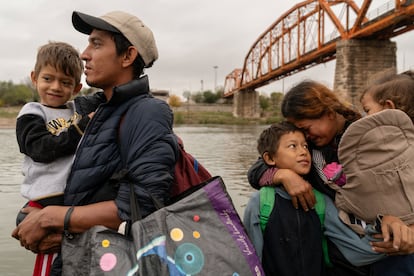Mexico and the United States to negotiate measures to address migration crisis
A delegation from Washington will visit Mexican President López Obrador on Wednesday to discuss how to stem the mass influx of people at the U.S. southern border

The migration crisis at the U.S.-Mexico border has put diplomatic relations on alert. Washington has decided to send a delegation to visit Mexican President Andrés Manuel López Obrador on Wednesday in a bid to negotiate measures to stop the mass flow of people to the southern border, where there has been an unprecedented surge of arrivals. The delegation — led by Secretary of State Antony Blinken — comes after U.S. President Joe Biden spoke to his Mexican counterpart about the border crisis in a phone call last Thursday.
The situation — which was already a hot potato for the U.S. administration — worsened between the end of November and the beginning of December. Due to the unusual spike in illegal border crossings — which rose by 31%, according to U.S. Customs and Border Patrol (CBP) data — some border crossings were shut in order to stem the large number of arrivals.
In response to the spike, Biden requested to speak with López Obrador about the crisis at the border on Thursday. The numbers this year have not stopped rising. Last week alone, more than 10,000 migrants were intercepted after crossing irregularly into the United States. “The president and President López Obrador agreed that additional enforcement actions are urgently needed so that key ports of entry can be reopened across our shared border,” the White House said in a readout of the call.
Reopening border crossings is one of the top priorities of the negotiations with the U.S. delegation, which will also include Secretary of Homeland Security Alejandro Mayorkas and Homeland Security Advisor Elizabeth Sherwood-Randall. During Thursday’s call, Mexico “insisted on the need to reopen border crossings as soon as possible to guarantee dynamic trade flows and enhance the economic relationship [between the U.S. and Mexico],” the Mexican Foreign Ministry said in a statement on Friday. The statement added that Mexico will call on the U.S. delegation to further collaborate “in addressing the structural causes of migration based on the results of the Palenque Meeting.”
The Palenque Meeting, which was held over five days in Mexico in October, brought together a dozen Latin American and Caribbean governments. One of its main focuses was on lifting U.S. sanctions on Cuba and Venezuela. The event — which was attended by Venezuela President Nicolás Maduro and Cuban leader Miguel Díaz-Canel, but not Biden — came to the conclusion that the “unilateral coercive measures” imposed against some countries in the region were a major factor in instigating migration to the United States.
The last time Biden and López Obrador met in person was at the Asia-Pacific Economic Cooperation (APEC) Summit in California in November. “The invitation from the president of Mexico continues the understanding reached by both leaders in San Francisco, regarding the appreciation of the positive contribution of the Mexican community in the United States and the conviction that the immigration problem will only find an effective response by addressing the structural causes in the countries of origin,” the Mexican Foreign Minister stated on Friday.
The López Obrador government is doubly affected by the migration crisis. On the one hand, thousands of migrants cross Mexico every month to reach the United States. On the other, it is facing a massive outflow of Mexican nationals who have joined the caravans in order to cross illegally to the north. López Obrador’s government estimates that of the 307,000 people expected to be detained at the border by the end of the year, almost 75,000 will be Mexicans.
These unprecedented numbers have led to the closure of border crossings. On November 27, the U.S. government decided to close the bridge linking Piedras Negras, Coahuila, with Eagle Pass, Texas, to people and vehicles coming from Mexico. The CBP said it made this decision due to the increase in irregular arrivals. For the same reason, on December 4 the crossing from Sonoyta, Sonora, to Lukeville, Arizona, was also closed. And on December 9, the crosswalk from El Chaparral, in Tijuana (Baja California), to San Ysidro (California), one of the busiest borders in the world, was shut down.
Sign up for our weekly newsletter to get more English-language news coverage from EL PAÍS USA Edition
Tu suscripción se está usando en otro dispositivo
¿Quieres añadir otro usuario a tu suscripción?
Si continúas leyendo en este dispositivo, no se podrá leer en el otro.
FlechaTu suscripción se está usando en otro dispositivo y solo puedes acceder a EL PAÍS desde un dispositivo a la vez.
Si quieres compartir tu cuenta, cambia tu suscripción a la modalidad Premium, así podrás añadir otro usuario. Cada uno accederá con su propia cuenta de email, lo que os permitirá personalizar vuestra experiencia en EL PAÍS.
¿Tienes una suscripción de empresa? Accede aquí para contratar más cuentas.
En el caso de no saber quién está usando tu cuenta, te recomendamos cambiar tu contraseña aquí.
Si decides continuar compartiendo tu cuenta, este mensaje se mostrará en tu dispositivo y en el de la otra persona que está usando tu cuenta de forma indefinida, afectando a tu experiencia de lectura. Puedes consultar aquí los términos y condiciones de la suscripción digital.









































